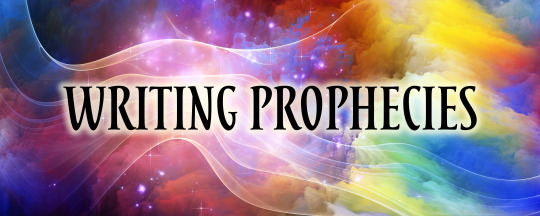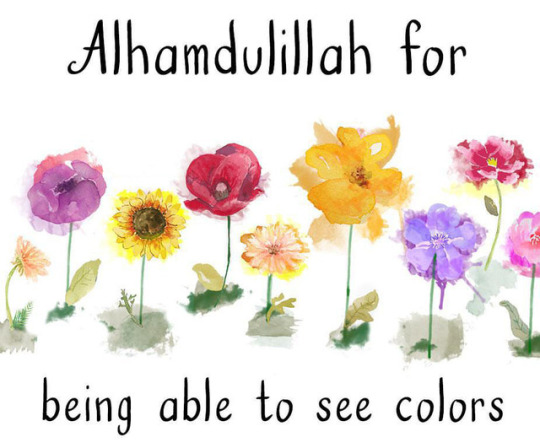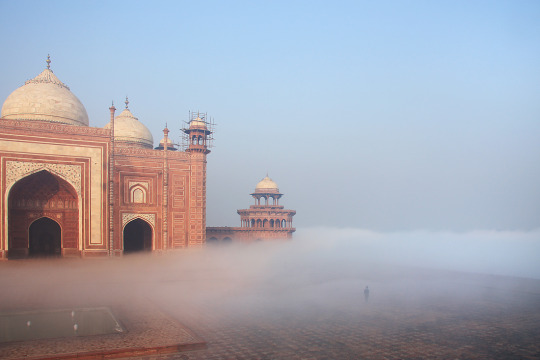Quote
Allah created both night and day. If it’s dark in your life right now, be patient. The sun always rises. And if it’s light right now, be thankful. But know that the sun must also set. Praise your Maker for both the night and the day, and know that He never sets.
Yasmin Mogahed (via racetofalah)
2K notes
·
View notes
Quote
اذا احداً يکر هـنى لسعادتى ادعى ان الله يرسل له سعاده لکى ينسى سعادتى
If someone hates me for my happiness, I ask Allah, that He sends him happiness so that he forgets mine. (via mira-mind)
5K notes
·
View notes
Photo

Using prophecies in fantasy without making eyes roll
Good ol’ stand-bys, ubiquitous fantasy tropes, are difficult to avoid. And sometimes we don’t want to avoid them. Goddammit, sometimes you just need a good, solid prophecy to write the story your want to write.
“It’s not my fault all these other people before me have written prophecies, too!” you say.
And you’d be right. Unfortunately, they did. So us modern-day writers have to live with the it. So what do you do when you want or need to use a well-worn trope?
Know the trope. Make it your own.
Know that, no matter what you do, some readers will still hate it.

But you can’t make everyone happy, right? So let’s get started.
How-to guidelines from our predecessors
Prophecies in fiction have been used countless times. But there are reasons why we continue to use them. And while you don’t want to completely copy how it has been done before, we can all learn something from the basic form of real and fictional prophecies.
1. Prophecies are often vague and general
The language and phrasing used in prophecies, because of its important and symbolic nature, tends to go for sounding mystic and grand over sensible and utilitarian. This language achieves its poetic goal, but as a price, the meaning can be allusive, vague, or even seem contradictory.
A man named Jerry will kill a man in a fight on the corner of 3rd and Main on the fifth of January, 3820.
On the dawn of winter in a forest of gray, when one life dims, another remains.
One of these actually gives you some useful information. The other could mean a vast array of different things at any point in time, but technically applies to the same situation. One of them (though poorly) reads more like something you’d find in a piece of fiction.
2. Prophecies are often misinterpreted
There’s likely to be disagreement on the meaning of any yet-to-be-fulfilled prophecy. If it’s well-known, then common folk might take it to mean one thing, while the wealthy another. The well-educated might take it to mean one or two (or three or a thousand) things, while the uneducated take it to mean another. If there are two prominent schools of thought, then people might passionately disagree about the meaning. It’s possible that none of these interpretations are true.
‘Tis the nature of vague and metaphorical language.
The culture of your world will influence how people treat the prophecy. Conversely, the prophecy and its interpretation might have a huge impact on the culture, government, or religion of your world.
3. Prophecies are given in context
In the example above about the murder in winter, with no context that “prophecy” means basically nothing. Part of what creates nuances in interpretation of prophecies is variations in the understanding of the prophecy’s context.
Upon the rebirth of the emperor, the dark messenger will be slain; the eagle will conquer the land.
In this sample, very little is made clear when there’s no context. We have no reason to care, let alone believe, what these words are trying to convey. But say that our myths tell the story of a vanished young emperor who would someday reappear to take his throne, that the messengers of evil are immortal, and that the eagle is symbolic of peace…
It all starts to make a bit of sense, doesn’t it? Any alteration in context, however, could vastly change the meaning.
Prophecies don’t stand alone. They only work within their context. They aren’t created in a vacuum and they are not understood in a vacuum. Creating the vibrant world that surrounds your prophecy will go a long way to making it interesting and important.
4. Prophecies require a prophet
Why do people believe the prophecy? Why don’t they? When implementing a prophecy into your world, you need to pay attention to how people receive its message and ensure that that belief has a sensible backing.
A prophecy came from the mouth (or pen) of a prophet. If the people of your world totally buy into the words of this prophecy, then there needs to be a reason. What made this prophet reliable?
What not to do: There was this old woman and everything she said was totally batty…all except this one thing. This one thing will definitely be absolutely true, so help me, God.
Like any aspect of culture, the “why” factor is important. Why do people believe the prophecy? Why has it survived so many years? Or perhaps people don’t believe the prophecy…so why is that?
Consider Nostradamus. He’s a pretty infamous prophet, even though only some of what he said every seemed true (and almost entirely in retrospect). For the most part, when you mention him, people will kind of laugh it off. It’s mostly a joke. However…his words might also be true! But it’s best not to put all your money on it.
How are the words of your prophet generally received? How will this affect how your Important Prophecy™ is viewed and understood by the people?
“This Important Prophecy™ is believed because my story needs it to be believed,” is not a good reason. So make sure it runs deeper than that.
Pitfalls to avoid
1. Using a prophecy as a matter of course
Your prophecy should have a very integral part in your story and world. Using a pointless prophecy or using one just because you think, since you’re writing fantasy, you probably should, are one-way tickets to eye-rolls.
Like any trope, if you’re sticking it artlessly into your story, then you doing the trope and yourself a disservice. Every element you choose to include in your story should drive it forward, should deepen your conflict or characters. No inclusion should be made flippantly. Be sure that if you’re including a prophecy, you use it to its full potential.
2. Making it too simple or mundane
If you’re doing it right, then your prophecy will be super important to your story. And if it’s super important, you’re going to want it to be super interesting. If a dull, run-of-the-mill Chosen One prophecy is, unironically, what your story hinges on, then you’re likely going to get some eye-rolls and, worse, readers who put down your book.
3. Going for too much
On the other end of the spectrum, prophecies that are convoluted or require the ten-page backstory to put into context are likely going to take too much attention away from your actual story. Prophecies tend to focus on one (general) event. It can cover a few facets of this one event, but if you try to outline too much you risk detracting from the here-and-now or getting too far in over your (or your character’s) head.
Things to consider
Is the fulfillment of the prophecy a mystery even to your reader? Or does the story give the answer, leaving the path to the fulfillment to be the mystery?
Is your prophecy immutable? Is it Destiny and it will come true no matter what anyone does?
Is the prophecy self-fulfilling? How do the characters’ knowledge of the prophecy affect events? How might their ignorance of it?
How does the fulfillment differ or align with the expectations held by the characters?
Did the prophet speak of their own freewill, with true foreknowledge, or were they a vessel for a deity, or some supernatural being?
How was the prophecy passed down to the present? Was it done so flawlessly, or might there have been translation, oral, or interpretation errors that happened along the way?
How widely accepted, or known, is the prophecy among the common people?
How common are prophecies in general? Does this one stand out in some way? If so, how and why?
Does the prophecy give away an outcome, or does it simply set up a situation?
How detailed is your prophecy and how have those seemingly specific details been misinterpreted?
How certain is anyone that they understand the prophecy?
If the prophecy proves to be false, how does that element find resolution within the structure of the narrative? (i.e. if you placed great importance on the prophecy with the intention of pulling the rug out from under your reader, how are you going to resolve the situation to keep them from feeling cheated?)
What do you think about the use of prophecies in fiction? What are some of your favorites or least favorites?
Happy writing!
2K notes
·
View notes
Text
The greatest gift
I have ever received
Is the warmth of the sun
Embracing me
On days
When i couldn’t
Even see
My own
Light
This is how He forgives
317 notes
·
View notes
Text
Imagine you’re running towards your family who are on the brink of dying from thirst and you have a bucket of water but there is a hole in that bucket. So you put your hand on that hole to stop the water but the water is slipping out from your fingers.
This is our analogy on earth.
We are all running towards the Hereafter. Whether in the right or wrong direction, but we’re running that way and time is slipping away from our fingers just like the water from the bucket.
Don’t be from the people of the fire who will scream, begging Allah for a second chance and Allah will say to them,
“Did we not give you life long enough for whoever would remember therein to remember?
And the warner had come to you?
So taste [the punishment], for there is not for the wrongdoer any helper.”
[Surah Fatir: 36-37]
Time is valuable.
That tick from the clock will never come back again.
What are we doing with our time?
193 notes
·
View notes
Photo

Everyday is a gift from Allah. A chance to repent, a chance to do more good deeds, a chance that Allah gives us so we can get closer to Him.
Don’t let your sins be a reason that you distance yourself from Him.
Repent and turn your heart to Him and know that the One who created all this beauty can never leave you to your self.
688 notes
·
View notes
Text
Only straight muslim men get the privilege of accusing marginalized muslims of practicing “liberal” Islam because “traditional” Islam benefits them only and they could care less about the rights of others. It’s really easy to defend sexist, homophobic, ableist distortions of Islam when you benefit from those distortions.
Just because the Islam that women, LGBTQ muslims, disabled muslims, and muslims with mental health issues have embraced doesn’t look like your “traditional” Islam doesn’t make it wrong. It means we’re trying to carve out a space for ourselves in a religion that was hijacked by patriarchy not long after the Prophet (saw) passed away.
And no, Islam was never meant to be this way. Islam is not patriarchal. The Prophet never advocated for people to be marginalized. But here we are now. So don’t shame people looking for an Islam that allows them to be an active member. Look at yourselves and ask yourself why you felt the need to put Islam in a tiny, tiny box when it was meant to be for everyone. “Traditional” doesn’t always equal right and “liberal” doesn’t always equal bidah. We are all just looking for Islam.
3K notes
·
View notes
Quote
One of the biggest problems with religion is that people stubbornly, insistently reduce God to their own size; they imagine that God loves the same people they love, and that God hates the people they hate. This is not just insidious theology; it’s actually idolatry, because people are just worshiping a blown up version of themselves. So let me say it simply: God’s love transcends all of that.
When your parents reject you, God loves you; when your friends or classmates make fun of you, God loves you; when your priest, minister, imam, or rabbi tells you that you are an abomination, God loves you; when politicians cater to people’s basest prejudices, God loves you. No matter how many times and in how many ways people make you feel less than human, God knows otherwise, and God loves you. When you feel frightened, or abandoned, or humiliated, I hope the unshakeable conviction that God loves you can help hold you and enable you to persevere.
From a Rabbi, An Open Letter To People Who Are LGBTQ by Rabbai Shai Held (via jewishtransition)
40K notes
·
View notes
Text
Without the light of Islam, we would be lost in this dark and sinister world.
260 notes
·
View notes
Text
I will never love anyone more than God and no one will love me like Him.
2K notes
·
View notes
Text
Only straight muslim men get the privilege of accusing marginalized muslims of practicing “liberal” Islam because “traditional” Islam benefits them only and they could care less about the rights of others. It’s really easy to defend sexist, homophobic, ableist distortions of Islam when you benefit from those distortions.
Just because the Islam that women, LGBTQ muslims, disabled muslims, and muslims with mental health issues have embraced doesn’t look like your “traditional” Islam doesn’t make it wrong. It means we’re trying to carve out a space for ourselves in a religion that was hijacked by patriarchy not long after the Prophet (saw) passed away.
And no, Islam was never meant to be this way. Islam is not patriarchal. The Prophet never advocated for people to be marginalized. But here we are now. So don’t shame people looking for an Islam that allows them to be an active member. Look at yourselves and ask yourself why you felt the need to put Islam in a tiny, tiny box when it was meant to be for everyone. “Traditional” doesn’t always equal right and “liberal” doesn’t always equal bidah. We are all just looking for Islam.
3K notes
·
View notes
Text
the feeling of relief when you realized you weren’t going to have to marry a man one day is literally like taking your first breath after being fucking buried alive
11K notes
·
View notes
Text
on butchness and growing up
when i was 13-14 a camp counselor assigned me the role of love interest and made me up in a dress and curls because she quote “wanted to see what id look like”
countless times through my youth similar things happened with classmates, friends and adults.
these are experiences that butches are presented with as kids; adults and peers are constantly trying to “fix” us because in their eyes we’re a wrong that can righted, if some charitable soul (them) just “shows us” how to be feminine.
this developes into compulsive femininity nine times out of ten in different stages of a butch woman’s life. im here to say that there is nothing about you that needs to be fixed and you are the best version of yourself you could ever be.
3K notes
·
View notes
Text
اللهم لاُتعلق قلبي الضَّعيف بِما ليسَ لي
oh allah, don’t let my weak heart get attached with what’s not mine
4K notes
·
View notes











